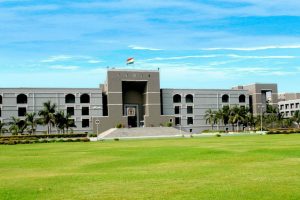Gujarat High Court: Vaibhavi D. Nanavati, J., compounded an offence under Section 138 of the Negotiable Instruments Act and set aside the conviction and sentence of the accused, while observing at the same time that generally powers under Section 482 CrPC are not to be exercised when a statutory remedy is available under law.
Brief Facts of the Matter
Applicant issued a cheque of amount Rs 9,00,000 in favour of the original complainant and on depositing the same, the cheque came to be dishonoured with the notings that ‘Account Closed’.
After issuance of notice, original complainant instituted the Criminal Complaint about the alleged offence punishable under Section 138 of the Negotiable Instruments Act, 1881.
Trial Court had convicted the applicant imposing 1-year imprisonment and also directed the applicant to pay compensation to the tune of Rs 13,50,000.
Original complainant thereafter instituted Criminal Appeal for enhancement of sentence. But later, both complainant and respondent 2 arrived at a settlement which was reduced in writing form.
Analysis, Law and Decision
While pronouncing its decision Court stated that it would be apposite to refer to the observation made and guidelines issued by the Supreme Court in the case of Damodar S. Prabhu v. Sayed Babalal H., (2010) 5 SCC 663.
Further, the High Court referred to a plethora of decisions with respect to the issue involved in the present matter.
Respondent 2 on 31-03-2021 stated that the parties have arrived at a settlement and the entire amount agreed between the parties was received by respondent 2 and that now he had no objection if the conviction of the applicant with respect to present offence was quashed.
Bench added that,
Applying the ratio of various decisions by this Court and the Supreme Court as well as in view of the guidelines as laid down in the case of Damodar S. Prabhu v. Sayed Babalal H., (2010) 5 SCC 663 as also considering the object of Section 138 of the NI Act, which is mainly to inculcate faith in the efficacy of banking operations and credibility of transacting business through cheque as also taking into account the provisions of Section 147 which states that every offence punishable under this Act shall be compoundable.
High Court also noted that generally the powers available under Section 482 of the Code would not have been exercised when a statutory remedy under the law is available, however, considering the peculiar set of facts and circumstances it would not be in the interest of justice to relegate the parties to the appellate court.
In Court’s opinion, taking into account the guidelines as laid down in the case of the above stated Supreme Court decision and the fact that the parties have settled the dispute amicably, the compounding of the offence was required to be permitted.
Hence the present application was allowed. The decision passed by Additional Senior Civil Judge and Additional Chief Judicial Magistrate under Section 138 NI Act was set aside. [Khokhar iliyas Bismillah Khan v. State of Gujarat, 2021 SCC OnLine Guj 852, decided on 06-05-2021]

